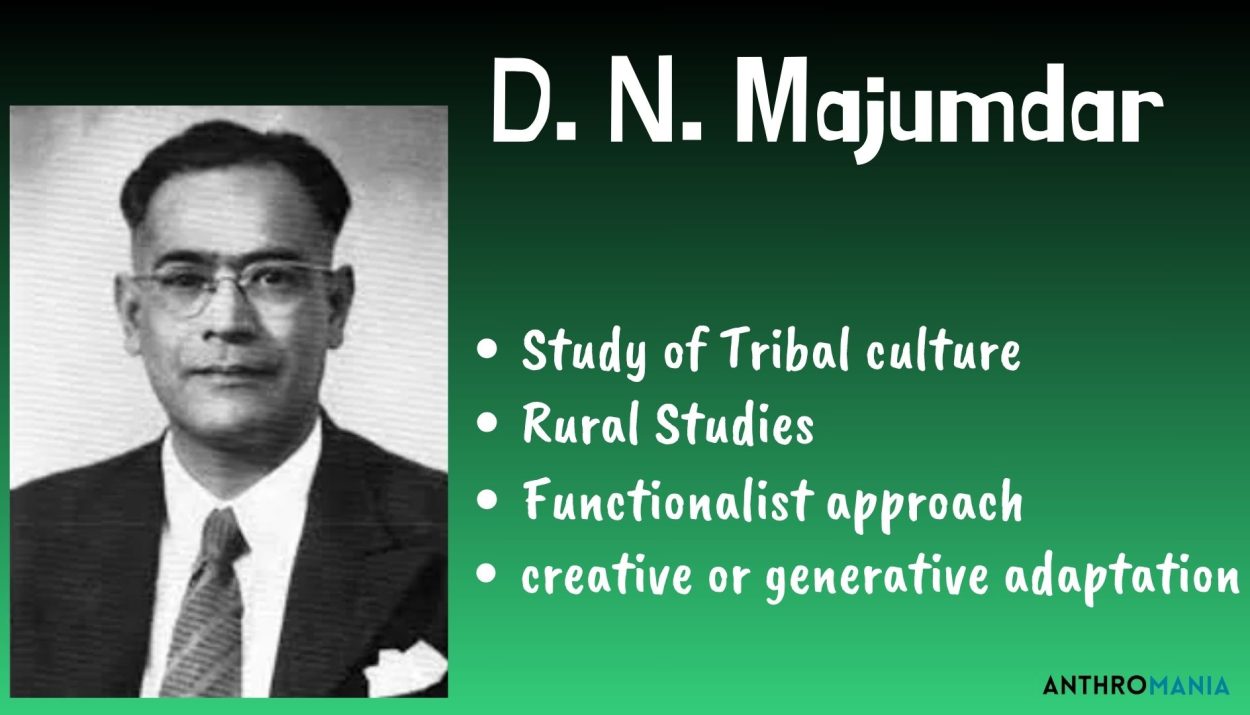Anthropology, a discipline dedicated to understanding human societies and cultures, has been significantly shaped by the contributions of trailblazing scholars. One such luminary is D. N. Majumdar, whose impactful work has left an indelible mark on the field. In this article, we will delve into the life, achievements, legacy and D. N. Majumdar’s contributions.
Academic Journey
Dhirendra Nath Majumdar’s (D. N. Majumdar) journey into the world of anthropology began with his early life and education. Born on 3 June 1903 in Patna, Majumdar displayed an early fascination with diverse cultures. His academic pursuits led him to excel in the study of anthropology, laying the foundation for a remarkable career. In 1924, he became a Master in Anthropology at Calcutta University. In 1928, he assumed the role of a lecturer in ‘Primitive Economics’ at the Department of Economics and Sociology, Lucknow University.
In 1935, he attained his PhD from Cambridge University and a fellowship in the Royal Anthropological Institute of Great Britain and Ireland in 1936. His fieldwork focused on the Ho tribe in the Kolhan region of Chotanagpur. In 1951, Professor D.N. Majumdar played a pivotal role in establishing the independent Department of Anthropology at Lucknow University, assuming the role of its Head. Under his guidance, the department soared to prominence both nationally and internationally, a noteworthy achievement given the nascent stage of Anthropology in India at that time. Prof. Majumdar passed away in 1960 while still actively engaged in his service.
Research work
Majumdar’s scholarly endeavours spanned various facets of anthropology, with a particular emphasis on cultural anthropology and physical anthropology. His groundbreaking research shed light on the intricate tapestry of human diversity, challenging prevailing notions and pushing the boundaries of anthropological understanding.
He is often recognized as a trailblazer in the field of ‘village studies.’ In 1953, he joined forces with M. E. Opler from Cornell University for a collaborative research project focusing on village studies. He adopted a functionalist approach to studying culture.
Study of Tribal culture- He did not endorse the concept of a ‘Tribal Reserve Area’; instead, he advocated for the integration of tribes into Indian society, a process he termed “creative or generative adaptation.” His stance emphasized the importance of giving respect to backward communities by dominant groups. Notably, his book titled ‘A Tribe in Transition: A Study in Culture Pattern’ (1937) stands as the inaugural scientific exploration of the impact of modern civilization on Indian tribal communities.
Distinguished as the first Indian anthropologist to examine and document the influence of non-tribal culture on various aspects of tribal life, he conducted extensive ethnographic studies. His fieldwork encompassed the Ho (Bihar), the Khasa, the Korwa, the Tharu, the Gonds of Bastar (M.P.), the Bhil of Gujarat, and the so-called criminal tribes of U.P. Utilizing local dialects, he comprehensively covered essential facets of their cultures, including economics, kinship, marriage, religion, and more.
Rural Studies- He significantly contributed to the promotion of rural studies in India, particularly advocating for village studies. In his book titled “Caste and Communications in an Indian Village” (1958), he introduced a model for anthropological village studies. According to his perspective, anthropologists and sociologists could play a crucial role in delving into the issues faced by backward classes. Additionally, they could evaluate the effectiveness of community development programs at the village level. By doing so, anthropologists could aid the government and administration in formulating appropriate strategies for tribal and backward classes and assess the implementation of these strategies.
Read- S. C. Dube’s Contributions
Recognitions of D. N. Majumdar
In 1939, he assumed the role of President for the section of Anthropology and Archaeology during the 26th Indian Science Congress held in Lahore. Furthermore, he earned a fellowship in the American Association of Physical Anthropology. Recognizing his significant contributions, he was honoured with the Research Medal by the Gujarat Research Society, Bombay, in 1950. In 1958, the Asiatic Society of Bengal awarded him the Annandale Gold Medal for his noteworthy contributions to Asian Anthropology.
During the decennial census operations of 1941, he actively participated and collaborated with P. C. Mahalonobis in conducting anthropological and serological surveys in the United Provinces (now Uttar Pradesh). Collaborating with Verrier Elwin, he pioneered ‘problem-oriented ethnography.’ Between 1945 and 1947, he established the ‘Ethnographic and Folk Culture Society’ (EFCS) in Lucknow, under which the ‘Eastern Anthropologist’ emerged as a leading journal in anthropology. His expertise was further acknowledged through lectures delivered at numerous esteemed national and international institutions.
Legacy and Noteworthy Publications
Prof. Majumdar’s contributions to both Physical Anthropology and Socio-Cultural Anthropology, coupled with his commitment to staying abreast of the latest trends in the field, positioned him as a leading figure in Anthropological thought on the Indian subcontinent. Serving as both a prolific researcher and an inspirational teacher, he mentored numerous students.
The enduring legacy of D. N. Majumdar can be measured in the generations of anthropologists he inspired. His methods, perspectives, and dedication to rigorous scholarship continue to resonate in the discipline. Majumdar’s influence is evident in the ongoing exploration of human societies and cultures.
A prolific writer, Majumdar authored several seminal works that continue to be regarded as essential references in anthropology. His publications, characterized by meticulous research and a commitment to clarity, include “The Races and Cultures of India (1944)”, “A Tribe in Transition (1937)”, Himalayan Polyandry (1962) and “An Introduction to Social Anthropology (1956)” (book with T. N. Madan).
Conclusion
D. N. Majumdar stands as a towering figure in the realm of anthropology. His life’s work, marked by intellectual rigour and a passion for understanding human diversity, remains a cornerstone for scholars and enthusiasts alike. As we navigate the rich tapestry of anthropological exploration, we owe a debt of gratitude to the legacy of D. N. Majumdar.
References
DHIRENDRA NATH MAJUMDAR (1903-1960)
Professor Dhirendra N Majumdar
